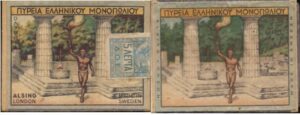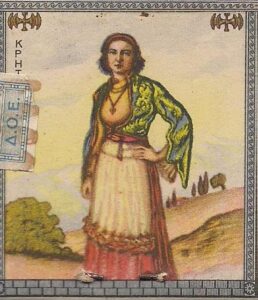 In many Greek matchboxes of the first period -that is, until 1961- we see that in the security tape they had the greek acronym «ΔΟΕ». Of course, your mind should not go to the International Olympic Committee, or of course to the Teachers’ Federation of Greece, that both have the same greek acronym «ΔΟΕ». It regards the International Financial Control. This was the name of the supervision of Greece’s public finances imposed by European countries that lent to Greece in autumn of 1897 when the country bankrupted four years earlier, in order to repay its debts to its creditors. The audit was carried out by a six-member committee, the International Economic Committee (Commission Internationale Financière de la Grèce), with permanent establishment in Greece from 1897 to 1978, for 81 years!
In many Greek matchboxes of the first period -that is, until 1961- we see that in the security tape they had the greek acronym «ΔΟΕ». Of course, your mind should not go to the International Olympic Committee, or of course to the Teachers’ Federation of Greece, that both have the same greek acronym «ΔΟΕ». It regards the International Financial Control. This was the name of the supervision of Greece’s public finances imposed by European countries that lent to Greece in autumn of 1897 when the country bankrupted four years earlier, in order to repay its debts to its creditors. The audit was carried out by a six-member committee, the International Economic Committee (Commission Internationale Financière de la Grèce), with permanent establishment in Greece from 1897 to 1978, for 81 years!
In 1893, Charilaos Trikoupis declared bankruptcy during his last prime ministership. At that time, some control was imposed by the creditors, which was formal and not substantial, without the possibility of substantial intervention in the Greek public finances. However, the involvement of bankrupt Greece in a conflict with Turkey, in the Greek-Turkish war of 1897, found Greece in an extremely difficult position with the Greek army unable to confront the Ottoman troops, who had occupied Thessaly and part of Central Greece. The Peace Treaty of September 20, 1897, in which Greece was forced, provided war reparations of four million Turkish pounds, the immediate payment of which was demanded by the High Gate. The government of Alexandros Zaimis was forced to negotiate with the creditors of Greece for additional borrowing (while four years ago Greece had already stated that it was unable to repay the already owed loans). The negotiations of the Greek government led to the imposition of the International Financial Control, for the economic reconstruction of the country that would ensure to the creditors the repayment of both the old and the new loans. Thus, on March 10, 1898, the Greek Parliament passed the law for the international financial control of Greek economics.
finances. However, the involvement of bankrupt Greece in a conflict with Turkey, in the Greek-Turkish war of 1897, found Greece in an extremely difficult position with the Greek army unable to confront the Ottoman troops, who had occupied Thessaly and part of Central Greece. The Peace Treaty of September 20, 1897, in which Greece was forced, provided war reparations of four million Turkish pounds, the immediate payment of which was demanded by the High Gate. The government of Alexandros Zaimis was forced to negotiate with the creditors of Greece for additional borrowing (while four years ago Greece had already stated that it was unable to repay the already owed loans). The negotiations of the Greek government led to the imposition of the International Financial Control, for the economic reconstruction of the country that would ensure to the creditors the repayment of both the old and the new loans. Thus, on March 10, 1898, the Greek Parliament passed the law for the international financial control of Greek economics.
It was a shameful act of the political parties towards the Greek people. According to historians, the control imposed then in Greece was heavier than the controls imposed in other underdeveloped countries, such as Tunisia, Morocco, Egypt, Turkey.
The International Economic Commission set up under the suggestion of the Great Powers, consisted of representatives of foreign banks and was based in Greece while its role did not stop at the control and management of state revenues, but also proceeded to the opinion on the issuance of money, on the conclusion of loans and in general on almost all fiscal issues. These superpowers of the International Economic Commission effectively overthrew the powers of the Greek government and Parliament for a long time, as the state’s decisions on economic development plans were controlled by centers outside Greece and in absentia of the Greek people.
The agreement with the creditors provided:
- War reparation loan and “financial loan”
A guaranteed loan of 151.3 million francs was granted by the Great Powers to Greece. The loan was taken in order to pay to the Ottoman Empire the compensations that Greece was obliged to pay to Turkey in the total amount of 93.9 million francs, also to pay the existing state debt of 31.4 million francs, the deficit of the Greek state for the year 1897 of 22.5 million francs and the costs of issuing the loan (bank brokerage fees, stamps) amounting to 3.5 million francs.
- Mortgage tax revenues to ensure the repayment of loans
In order to service the debt, the International Economic Commission acquired regular sources of revenue and was evaluating government services for their efficiency and tax collection capacity. Thus, the revenues of the monopolies of salt, oil, matches, playing cards, cigarette papers and Naxos emery, the tobacco tax, the stamp duties and the duties of the Piraeus customs were attributed to the International Economic Commission.
- Debt restructuring
It is a remarkable fact that initially the seat of the International Economic Committee was the current Palace of the Presidency of the Republic, which was erected for their needs! Prior to its final abolition in 1978, the International Economic Committee was based at Patriarchou Ioakeim Street in Kolonaki.
In conclusion, from the 200 years that have passed since the Greek Revolution, we may have freed ourselves from the Turkish yoke, but for almost half the years we have been -and officially- under the supervision of the “lenders” who actually make and take political decisions, in absentia and to the detriment of the Greek people and especially of the popular strata and workers.

